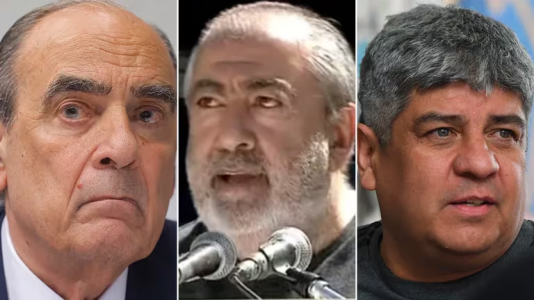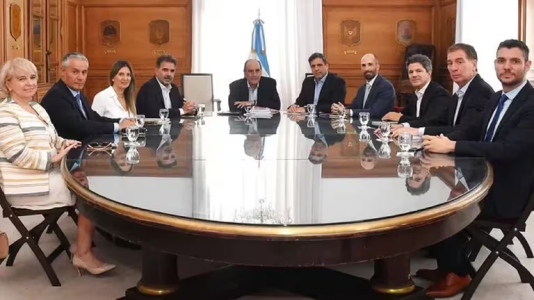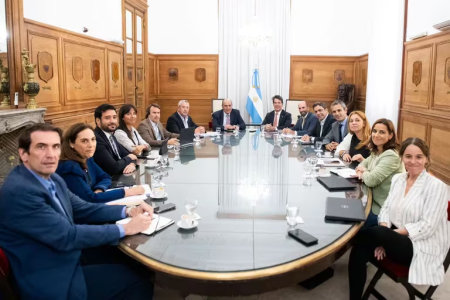All the Answers
Well-known member
The Government limited the labor reform pending negotiations with union members and the opposition - Infobae

Source:

El Gobierno acotó la reforma laboral a la espera de las negociaciones con sindicalistas y la oposición
La nueva ley bases incluyó artículos vinculados al blanqueo de personal y dejó afuera otras modificaciones que se creía que podrían ser debatidas en esta instancia
April 10, 2024
The new basic law included articles linked to personnel laundering and left out other modifications that were believed to be debated in this instance.
By Eduardo Menegazzi

Guillermo Francos, Héctor Daer and Pablo Moyano
For it to be approved in Congress, the ruling party is thinking about supporting a labor reform project prepared by a group of deputies from the Radical Civic Union and which also has the support of the other dialogue blocks that have maintained contacts in recent days. with the Minister of the Interior Guillermo Francos. In addition, the PRO legislators, whom they count as an almost unconditional ally in most decisions, are willing to support that same initiative.

It may interest you:The Government receives the CGT to negotiate a labor reform: Hugo Moyano participates
This afternoon's meeting, scheduled for 4:30 p.m., between Francos and the main Cegetista representatives at the Casa Rosada will be key to advancing the issue. in the midst of tensions with unionism due to the lack of approval of joint ventures and layoffs in the State. Among those who will attend are Héctor Daer (Health), Andrés Rodríguez (UPCN), Gerardo Martínez (UOCRA), Jorge Sola (Insurance union) and Carlos Acuña (SOESGYPE).
That is why the libertarian negotiators removed from the Base Law the articles of the labor reform that appeared in the mega DNU 70 of December and that arouse more resistance among unionists and would add the suggestions of radicalism.
One of the points of conflict is the limitation of solidarity dues, the most effective resource for financing unions through compulsory discounts of a sum agreed upon in collective labor agreements. The Executive had proposed that they must have the “explicit consent” of the worker to be discounted.
Another point of the DNU that the labor union emphatically criticizes is that it dilutes the ultra-activity of collective agreements, a principle that requires them to remain in force until a new one is negotiated, something that unionists strictly defend as a way of “preserving rights.” of the workers” and avoid a “downward negotiation”.

PRO deputies in the Casa Rosada with the Minister of the Interior Guillermo Francos and other national officials
The Milei decree, which remains blocked by Justice, contemplates that “a collective labor agreement whose term has expired will only maintain the norms referring to the working conditions established by virtue of them (normative clauses) and until they come into force. a new collective agreement or there is an agreement of the parties that extends it.” And he adds that "the rest of the (obligatory) clauses may maintain their validity only by agreement of the parties or by the specific extension provided by the National Executive Branch."
In Title V of the new text of the Base Law that was known this Tuesday night, articles ranging from 64 to 69 include issues related to money laundering and a moratorium for companies that regularize the employment situation of their workers. It also promotes criminal terminations, debt forgiveness and removal from the Registry of Employers with Labor Sanctions.
In article 64, for example, referring to “registered employment”, it states that “employers may regularize current labor relations in the private sector that began prior to the date of promulgation of this law. Regularization may include unregistered labor relations or poorly registered labor relations.”

Francos and Posse together with radical deputies
In the conversations between Francos and the PRO representatives, three projects were discussed to modernize labor legislation in line with DNU 70, as a way to unblock the discussion in Congress.
These included initiatives such as the extension of the trial period for workers from 3 to 8 months, the simplification of labor registration and the elimination of fines for lack of registration and the regulation of the right to strike in security services, transport , health and education by declaring them essential services, with minimum guards of 75 percent.
But for a sector of the Government, these three projects were considered “insufficient” because they did not include all the items of the labor reform that appear in DNU 70. The same happens with a similar proposal presented by the block of national senators of the UCR, whose The bill rescues only three of the changes that Milei wants: a Labor Termination Fund, the modification of labor fines and the extension of the workers' trial period to 6 months.
The CGT leadership will receive today at 11 a.m. a group of national senators from Unión por la Patria, with whom they will analyze a joint strategy to stop the Bases Law in the Upper House, including the restitution of the Income Tax.

